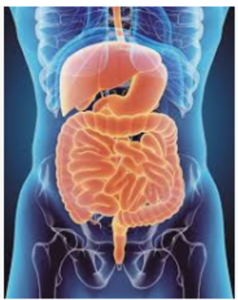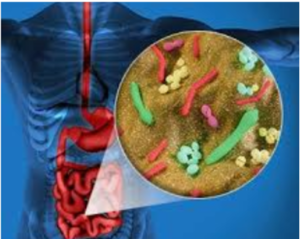These days, everywhere you look you’re bound to find doctors, nutritionists, celebrities, and fitness gurus talking about gut health. They use terms like microbiome, healthy bacteria, leaky gut, and prebiotics. Often times, these phrases are tossed around without providing  audiences with a sufficient understanding of what these things really are, how they interact with or affect one another, and why they’re even important in the first place – until now.
audiences with a sufficient understanding of what these things really are, how they interact with or affect one another, and why they’re even important in the first place – until now.
Over thirty years ago, while explaining the relationships between various systems of the body to a group of high school students, Steven Kazenoff, MD, FAAD, (dermatologic surgeon), equated the human body to a forty-passenger, twin propeller airplane from the 1950’s. His address was thoroughly laid out. He showcased how the human body (much like an airplane), is made up of an intricate network of systems intertwined with, and layered on top of other systems, with every one of them relying on the proper functioning of others.
He explained his theories on maintenance, and how differing levels of effort or neglect have a direct correlation to various levels of consequences (system stress, system fatigue, or system failure). And seemingly light years ahead of his time, Dr. Kazenoff, who was recently named “Top Doctor in the New York Metropolitan Area” by the Castle Connolly Guide, continuously posited how everything starts with fuel and the processing of fuel. That said, he is one of the early proponents of the (now, generally accepted) idea that numerous health issues can be corrected or ameliorated through conscious dietary changes.

Given the medical breakthroughs over these last three decades, it’s evident just how legitimate Dr. Kazenoff’s approach has been. Let’s explore his teachings on gut health a bit further.
Understanding Digestion
Our bodies rely on the food that we eat to build and nourish our cells and to aid with the production of energy. This occurs during digestion. Digestion is the process by which food is broken down, by enzymes, into molecules that are then absorbed into the bloodstream.  According to the University of Alberta’s IBD Clinic, the digestive process begins in the mouth, where food first enters the body and is chewed, and ends in the small intestine. As food moves through the GI tract, it mixes with enzyme-rich digestive juices, causing large food molecules to be broken down into smaller molecules. This enables the absorption of these smaller molecules into the bloodstream, which delivers them to the rest of the body.
According to the University of Alberta’s IBD Clinic, the digestive process begins in the mouth, where food first enters the body and is chewed, and ends in the small intestine. As food moves through the GI tract, it mixes with enzyme-rich digestive juices, causing large food molecules to be broken down into smaller molecules. This enables the absorption of these smaller molecules into the bloodstream, which delivers them to the rest of the body.
When these molecules first come into contact with our cells, they’re absorbed into the cytoplasm, (the gelatinous liquid inside our cells), and subsequently pulled into the mitochondria, (also referred to as a cell’s powerplant), where energy-rich molecules are created. This process is known as cellular respiration. This is one of the numerous stages in the whole digestive process. Further breakdown of food to fuel our bodies, takes place at each individual stage, where enzymes are used to enable absorption.
Understanding Digestive Enzymes
In general, enzymes are proteins that serve as biological “catalysts,” meaning they speed up chemical reactions. To the digestive system, enzymes are work horses that trap and breakdown large food molecules enabling them to be absorbed into the bloodstream and distributed to the rest of the body.
Without this enzymatic function, the body would suffer from malnutrition regardless of how frequently it consumes meals. There are even supplemental enzymes that not only support the body’s natural enzyme production and function, but can also provide further digestive activity to assist with food sensitivities, such as gluten or lactose intolerances. Simply put, the enzymes in our bodies, help to facilitate the body’s absorption of the nutrients found in the food we eat.
What Is a Microbiome?
The Oxford English Dictionary (OED) defines a “biome” as a distinct biological community that has formed in response to a shared physical climate. For instance, the Sahara Desert, along with all the living organisms for whom it is home, is an example of a biome. A microbiome is the same thing, only it’s a smaller biological community that contains all of the genetic material made up of microbes (bacteria, fungi, protozoa, and viruses). In fact, the human body is its own microbiome. The number of genes in all of the microbes in the human microbiome is estimated to be up to 200 times the number of genes found in the human genome. Furthermore, scientists estimate the weight of the hundreds of trillions of microbes that make up an adult human’s microbiome to be between five and six pounds.
According to the National Institute of Health’s Human Microbiome Project (HMPDACC.org):

In other words, the relationship we have with the microorganisms that make up our individual microbiomes is truly symbiotic. We can’t survive without them, just as they can’t survive without us. There are several sites within the human body where the highest concentrations of microbes exist, such as the mouth or the intestines (referred to as the gut), which is home to the single heaviest concentration. Studies over the past two decades have shown a direct link between the balanced health of these communities and illnesses including disorders of the endocrine system, mental health issues, autoimmune diseases, skin conditions, and even cancer. Factors like stress, consumption of processed foods, poor sleep habits, sugar intake, or even taking antibiotics, can affect the health of the gut microbiome, directly affecting our overall health and wellness. The “possibility that manipulation of these communities could be used to treat disease” explains the recent popularity of probiotics, and prebiotics.
What are probiotics?
Probiotics are live microorganisms that are also referred to as, “good bacteria.” When ingested, they add to the positive effects that the gut microbiome has on the body. The World Health Organization defines probiotics as “live microorganisms, which when administered in adequate amounts, confer a health benefit on the host.” The gut microbiome plays an enormously important role in keeping us healthy, therefore, it is critical to keep it functioning optimally. As things such as high stress levels, eating unhealthy foods, or not getting enough sleep can harm the gut microbiome, the ripple effect is seen in the heart, the immune system, brain health, hormone levels, nutrient absorption, weight control issues, and numerous other ailments.
Maintaining the balance of bacteria in your gut requires having a healthy level of good bacteria, which supports your immune system. Good bacteria may also help to improve symptoms of depression, aid in maintaining a healthy weight, among numerous other health benefits. Probiotics supplements help the efforts of the good bacteria that already exist in our gut, promoting our overall health and wellness.
There are numerous types of probiotics in existence and most fall into three main classifications, based on their activity and natural state: Lactobacillus, Bifidobacterium, and Bacillus.  Lactobacillus and Bifidobacterium are common probiotics naturally found in your gut and in traditional dairy-based foods. These types of bacteria dwell in their vegetative state where they’re more fragile and sensitive to many food and beverage manufacturing conditions. The Bacillus type are spore-forming probiotics that have a protective shell around them, enabling them to remain dormant and withstand the harsh interactions with stomach acids until the appropriate conditions for germination are reached in the intestines, where nutrients are absorbed.
Lactobacillus and Bifidobacterium are common probiotics naturally found in your gut and in traditional dairy-based foods. These types of bacteria dwell in their vegetative state where they’re more fragile and sensitive to many food and beverage manufacturing conditions. The Bacillus type are spore-forming probiotics that have a protective shell around them, enabling them to remain dormant and withstand the harsh interactions with stomach acids until the appropriate conditions for germination are reached in the intestines, where nutrients are absorbed.
“The biggest challenge for probiotics is survivability to ensure delivery at efficacious levels. At Deerland, our flagship probiotic, DE111, is a specific strain of spore-forming bacteria that not only has the competitive advantage to survive when other non-spores do not, but it also has many other clinically proven attributes to benefit overall microbial health. DE111 is supported by multiple safety and clinical trials to effectively promote digestive and immune health in adults and small children, muscle recovery, and cardiovascular health” states Leanne Levy, Director of Marketing, Deerland Probiotics & Enzymes.
What are prebiotics?
WebMD: “Prebiotics are special plant fibers that help healthy bacteria grow in your gut. This makes your digestive system work better.” An example is the fact that our bodies are unable to digest certain types of fiber. Thus, the bacteria and fungi within our gut microbiomes, thrive by consuming the very types of fiber that we aren’t able to digest.
In essence, prebiotics serve as the food that sustains the healthy bacteria that we need to sustain a state of wellness. Prebiotics are commonly found in a number of the foods, fruits, and vegetables we regularly eat, such as asparagus, bananas, garlic, apples, and cocoa. Because we can’t digest the fiber in these foods, the fiber is pushed into the lower intestine where it becomes a feast for our healthy gut bacteria.
Some research suggests that prebiotics may benefit the body by:
• improving calcium absorption
• changing how quickly the body can process carbohydrates
• supporting the growth of probiotic gut bacteria, potentially enhancing digestion and metabolism
The last lingering question is: Should you take probiotic supplements, or prebiotic supplements, or both? As strong, long-time supporters of health freedom, we at Harvest Wholesalers, LLC., and FarmersMarketWellness.com believe that answer is your choice to make, especially since everyone’s body and bodily processes are unique. Currently, there isn’t enough research to support full understanding of long term effects experienced from the use of probiotic or prebiotic supplements. While it’s been researched for twenty years, that isn’t considered to be a very long time for observation in the world of science. There is currently no evidence that posits taking prebiotics and probiotics together is harmful. However, as with most supplements, our recommendation is for individuals to consult their physician or primary care practitioner. Furthermore, we do not recommend the usage of probiotic or prebiotic supplements for those with chronic diseases or serious illnesses, unless otherwise advised by a licensed medical professional.
If you are looking for a probiotic to help your gut health, check out the probiotic supplements we offer in our online store here.
